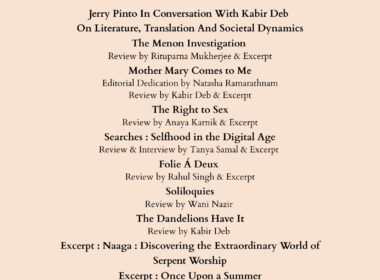Excerpts : The Right to Sex
By Amia Srinivasan

Image Courtesy of Bloomsbury Publishing
(Chapter – Conspiracy against Men)
I do not mean to overstate the issue. More than enough men have been called out online for bad or even criminal behaviour without serious repercussion. Many more, presumably, are never called out at all. Of the seventeen men accused of sexual violence by multiple anonymous women on the Shitty Media Men list, only a handful appear to have faced formal professional sanctions, forced to resign from their jobs or banned from contributing to particular publications. None are in hiding. Apparently one of them has had a standing lunch date with Woody Allen, during which they discussed their respective victimisation by feminists. Harvey Weinstein was sentenced to twenty-three years in prison, a cause for rejoicing on feminist Twitter, yet it had taken a Pulitzer Prize-winning journalistic investigation, a viral social movement, more than a hundred women coming forward and six of them taking the stand, and at the end of it all Weinstein was convicted on just two counts: rape in the third degree and criminal sexual assault in the first.
And yet, if the aim is not merely to punish male sexual domination but to end it, feminism must address questions that many feminists would rather avoid: whether a carceral approach that systemically harms poor people and people of colour can serve sexual justice; whether the notion of due process – and perhaps too the presumption of innocence – should apply to social media and public accusations; whether punishment produces social change. What does it really take to alter the mind of patriarchy?
~
(Chapter – Of Not Sleeping With Your Students)
It is hard to read someone’s mind on the basis of one letter. Perhaps the student simply admires and wants to be like Kincaid. Or maybe she doesn’t know what she wants: to be like Kincaid, or to have Kincaid. Or she wants both, and takes having Kincaid as a means to, or a sign of, being like him. Or she believes that she can’t ever be like Kincaid, and so longs, as a second best, to have him instead. Perhaps, even, she just wants to have sex with Kincaid, and all the talk of poetry is just an attempt at seduction. Still, whichever of these possibilities is right, it may well be possible for Kincaid to get his student consensually to have sex with him. Where a student’s desire is inchoate – Do I want to be like him, or to have him? – it is all too easy for the teacher to steer it in the second direction. Likewise when the student (wrongly) thinks that sleeping with her teacher is a means to becoming like her teacher, or a sign that she is like him already (He wants me so I must be brilliant). Even where it is clear that the student’s desire is to be like the teacher, it’s not hard for a teacher to convince the student that her desire is really for him, or that sleeping with him is a way to become like him. (What better way to understand the ‘feelings’ of the Romantic poets than to experience those feelings yourself?)
Whatever may be in the student’s mind, it is surely the case that Kincaid’s focus, as a teacher, should be on directing his student’s desire away from himself, and towards its proper object: her epistemic empowerment. If this is what the student wants already, then all Kincaid has to do is exercise some restraint, and not sexualise what is a sincere expression of her desire to learn. If the student is ambivalent or confused in her desires, Kincaid must go a step further and draw boundaries, redirecting the student’s desires in the proper direction. Freud thinks that in psychoanalysis this should be done explicitly, by telling the patient that she is experiencing transference. In the pedagogical context, taking that approach would be deeply awkward. (For all the intimacy of the teacher–student relationship, teachers aren’t supposed to be reading their students’ hearts, even if we can.) But there are subtler ways to redirect a student’s energies, quiet ways of stepping back, drawing attention away from oneself and towards an idea, a text, a way of seeing. By failing even to try to do this, Kincaid fails to be what his student is praising him for being: a good teacher.
Excerpted with permission from The Right to Sex by Amia Srinivasan published by Bloomsbury Publishing 2022.
Amia Srinivasan is the Chichele Professor of Social and Political Theory at All Souls College, Oxford and a contributing editor at the LRB. Her first book, The Right to Sex: Feminism in the 21st Century, was published in 2021. The title essay was first published in the LRB as ‘Does anyone have the right to sex?’ She’s also written for the paper on subjects including free speech on campus, pronouns, octopuses, bestiality and sharks.

Image Courtesy of Bloomsbury Publishing




